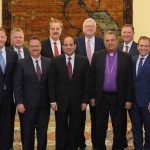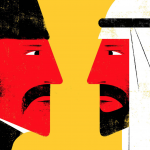By Clifford Smith – Washington Project Director for Middle East Forum
Let me begin with a qualifier: While I am an observer of Middle Eastern affairs and try to be as knowledgeable as one who works with such issues on a daily basis and feel as if I can discuss these topics intelligently, I myself am not an expert, on Egypt, Coptic Christians, or any other related topic, really. So, my remarks should be taken as an observant amateur who deals with such topics but is not nearly as deeply versed in these issues as some of my fellow panelists.
MY job as the Washington Project Director is to take things I learn about these topics and translate them into action the best I can for people in Congress, in the Administration, and to other political actors in and around Washington. I try to follow politics all over the world. And I DO know a little bit about how international politics work.
What I am hoping to discuss briefly is the threats to Coptic Christians in Egypt and how American politics might make a difference.
In my view, the threat to Coptic Christians in Egypt comes from intolerant, illiberal strains of Islam, often known as Islamism or radical Islam. This form of Islam does not respect other religions beliefs and refuses to grant equality to followers of other religions, including moderate forms of Islam which radicals do not view as true Muslims. But the threat is disproportionate to Christians.
This is especially true in Egypt.
While this form of Islam finds its roots in Islam, it does not represent most Muslims nor are such interpretations of Islam inevitable. As a minority in Egypt, Coptic Christians must make Muslim allies if they are to secure their rights and protect themselves from harm. Indeed, my, admittedly limited, reading of Coptic history for the past thousand years, Copts plight has diminished when more moderate Islamic leaders have held power, and increased when more radical, theocratic Islamic leaders have held power.
This brings us to a controversial topic, namely, current President Abdel Fattah el-Sisi.
To start off this conversation, let me relate a conversation I had with a friend of mine concerning another country, namely Saudi Arabia. I opined that Prince Mohammad Bin Salman, the reformist prince of Saudi Arabia who has made some bold strides to modernize his country, would either wind up as one of the greatest leaders in Arab history, or would wind up with a bullet in the back of his head.
My friend opined that it’s possible he could be both a great leader AND someone who wound up with a bullet in the back of his head, citing the late Egyptian President, Anwar Sadat, who famously made peace with Israel and later died in a hail of assassin’s bullets.
Perhaps this is an imperfect example to bring up, I am not unaware of the problems most Copts have with President Sadat. But the boldness of making peace with Israel cannot be reasonably denied and I think this illustrates a larger point. Radical movements such as the Muslim Brotherhood and various Salafist groups can and do threaten any non-radical Islamist leader in Egypt and any attempts to treat Jews, or Christians, with greater respect, or to promote their interests, carries with it real risks, even to their very lives. Sisi knows this.
As you all know, President Sisi came to power through a coup against former Muslim Brotherhood President Mohammad Morsi, who was, at least ostensibly, democratically elected, although I should note there were widespread and unfortunately not well reported examples of electoral corruption and a problematic process from the start. But, as President Trump said of Sisi with his characteristic bombast, “he took control of Egypt, he really took control of it!” Of course, in the aftermath of the coup, Brotherhood supporters specifically targeted Churches, which Sisi’s government fought to stop, and helped later to repair churches.
Since then, Sisi has relentlessly cracked down on the Muslim Brotherhood, his main opponent, but has done much less to crack down on Salafists and others.
Nonetheless, Sisi has been reasonably popular domestically, where the Muslim Brotherhood grew to be hated during their short reign, and increasingly accepted as legitimate internationally, particularly as President Trump gave Sisi a “big hug,” granting him legitimacy through a close relationship, something denied him by President Obama.
Yet Sisi remains controversial in Coptic circles.
Pope Tawadros, for example, supported the coup against Morsi. However, Coptic Bishop Macarius, head of the Coptic diocese in Minya, south of Cairo, deemed reinstituting an emergency law that was the hallmark of many of the abuses of human rights that took place under Hosni Mubarak’s reign, not as violative of rights, but as insufficient to protect Copts. At the same time, Sisi faced criticism for reinstituting state of emergency laws because they did too much. Indeed, in spite of this, Copts have suffered from what Tawadros has called a “wave of persecution” in recent years.
Sisi has made many symbolic gestures toward Coptic Christians. For two examples, he’s attended Christmas mass on multiple occasions, calling for unity and brotherhood of all Egyptians, and more recently appointed a Coptic woman, Nadia Ahmed Abdou Saleh, as Governor of the Damietta governorate. I do not view these actions as small or insignificant.
Nonetheless, actual security against radical Islamists would be far better than these symbolic gestures, which, while meaningful, are insufficient to protect the lives of Copts or to defend their rights. The main cause of the attacks on Copts and their rights have come from Muslim extremists that don’t believe that it is legitimate for Coptic Christians to build new Churches, or to have “house churches” used for worship. Sisi has championed law 80/2016 that would regulate for more building, but it has been criticized as having loopholes that allow for Governors to deny permits if they don’t believe there is enough of a need given the number of Copts in the area. While recent laws allow for the legalization of unlicensed “house churches,” there is still significant concern that when these churches are attacked, the perpetrators are not punished.
One reason for this is the Orwellian “reconciliation,” system that occurs when a Coptic institution is attached. When a period of “reconciliation” is called for, I’d say coerced, Copts are forbidden from rebuilding their Churches when attacked and services stop while the leaders of the community forgo their legal rights and seek to “reconcile” with their attackers. While the idea of reconciliation between neighbors is good in theory, the fact that they are not allowed to keep their churches open essentially means the attackers get what they want so long as they refuse to “reconcile,” namely, the end of a Coptic Church and the diminishment of Coptic rights.
This takes us back to Sisi.
I believe that, for whatever his flaws, which are many, Sisi wants to do the right thing regarding Copts, at least insofar as it fits his other political interests. But as non-Brotherhood radical Islamists are not his immediate enemy, and he’s thus done less to confront them, allowing them to go on persecuting Copts. His priorities are beating his most immediate rival, the Muslim Brotherhood, consolidating his rule and staying alive
However, in order to do this, Sisi wants and needs America’s help. How much he sought after Trump’s embrace alone is evidence of that. But there’s far more.
Egypt has been seeking closer and closer relationships with America across the board, government to government, person to person, military to military, you name it. A very recent high-profile example is the second-annual Bright Star exercises between the American Military and the Egyptian Military. This did not occur under the Obama Administration, and connections like this are highly sought by Sisi’s Administration.
A personal example: A Jewish friend who works for the American Sephardi Federation was traveling in North Africa and was asked to visit Egypt while he was on vacation after Sisi had reached out to American Jewish groups and learned that he was in North Africa. He, along with some other American Jews, were granted a personal audience with Sisi.
This need for American approval gives America a lot of leverage to change Sisi’s priorities. In other words: every Congressman who meets with Sisi who brings up the plight of the Copts and makes some reasonable request, such as, say, severely modifying or ending the reconciliation process, or issuing more permits for Copts to build churches, is likely to be listened to. A host of such requests will likely be honored, in at least some small way.
Any way people like us can influence our members of Congress, or people inside the Administration, to prioritize the interests of Copts and to bring it up when interacting with Sisi’s government, it is likely to pay dividends. Moreover, requests on the part of American Copts will matter as well. The more we in America, make ourselves heard, the more it will matter to Sisi.
Sisi is not a saint nor a Jeffersonian Democrat. His commitment to Coptic interests will vary significantly based on how he is incentivized. He won’t make fundamental changes and probably can’t even if he wants to, in the short term. But his desire to be in American good graces gives significant ability for people like us to ensure he gets the message that if he desires closeness with America, he will pay attention to the plight of Copts, and that includes staring down radical Islamists of all stripes, not just his most immediate enemy, the Muslim Brotherhood.
Thank you.




